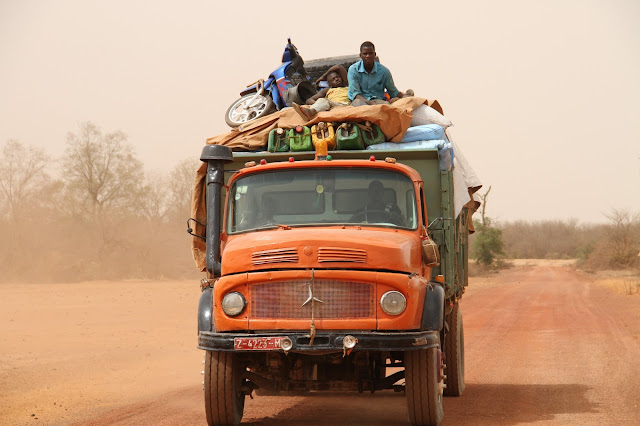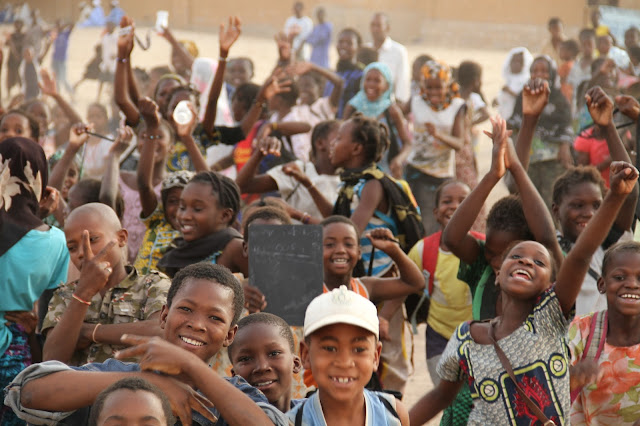I open my suitcase and it looks like a bomb has exploded inside my room. Among the debris, and the dirty laundry, there are plenty of images of kids smiling in the dusty rubble, the smell and taste of spiced roasted lamb and sounds, many sounds: distant Muslim calls to prayers in a desert town, the music of Mali, teenagers screaming at a soccer match ... and no doubt, among all those fragments, I also brought with me some important life lessons.
This is the first, of those life lessons: "Heroes do exist"
I saw them all around me, almost everywhere I went.
There are local heroes, those who believe that change can happen within their wrecked communities and countries. And then, you find the guest stars, those who have traveled from very far away, give up time with their loved-ones and the comfort of our privileged life to do "Something". Something with capital "S". We're talking about true first responders who have gone to Africa to roll up their sleeves and stick their arms in the guts of our planet.
At first sight, heroes may look like you and me... but if you look carefully, you will realize very soon that they actually look better. Yes, like in the movies, true heroes are better looking!! They glow! There is something about their presence, the way they stand, sit and walk, and something also about their capacity to listen that makes heroes magnetic.
Heroes tend to be free from the thousand stupid things that irritate and ruin our spoiled day-to-day lives.
Maybe because they know about those things that truly matter, maybe because they have witnessed too much desolation not to appreciate every breath they take. Maybe because they still believe there is a world filled with real, non-virtual, human beings outside the screen of their smartphones.
The first hero, of several I want to talk about, was the chief of my expedition, and the lead character in our work in progress: Dr. Robert Murphy. Dr. Murphy is a Professor at Northwestern University and the Director of its Center for Global Health.
Dr. Murphy visiting a local HIV clinic in Bamako, Mali.
Through many years of work at Johns Hopkins Medicine, in Baltimore, I've had the unique fortune to work with some of the greatest academic doctors and scientists in the world. I can unequivocally say that I've never, ever, met a doctor quite like Dr. Murphy.
Academic physicians, from the top-tier US centers, are rock stars in the scientific world. Although their income pales in comparison to what American bankers and top businessmen make, academic doctors tend to do fairly well financially, thanks to a combination of tenured salaries and consulting gigs, at times complemented by private businesses and investments.
In any major American city, academic physicians from the top centers are also an important, and very respected component of the local high society. In America, sometimes, academic physicians are nothing short of walking gods.
Because of this social popularity and benefit, it's not difficult for an America academic physician to get lost in his or her own ego, in the politics of an institution, in the demands of fundraising at cocktail parties and/or in the glamour of the "beau monde."
This context is important to understand why I regard Dr. Murphy as a bona fide hero. A successful American professional, with such an illustrious and long career, could very easily enjoy a very comfortable life in Chicago, drinking martinis and smoking cigars, without the need to complicate his life any further.
And still, Dr. Murphy is one of those heroes who at one point decided to stop looking at the firemen struggling with their hoses, and chose to join in the fight against the fire.
His commitment to global health and humanitarian causes has made Dr. Murphy put his own life at risks, many, many times. Our recent humanitarian action to reach a forgotten hospital devastated by jihadist in the remote area of Timbuktu, in Northern Mali, is just one more example of how far he is willing to go in his brave commitment to help with the fire. He got there before United Nations’ blue helmets.

In Timbuktu, assessing the damage suffered by the local hospital during the yihaddist occupation.
Beyond the danger, there also is the issue of inconvenience. Africa is, among many other things very, very inconvenient. Our humanitarian trip to Africa was no luxurious safari vacation. I've seen Dr. Murphy endure impossible travel itineraries and long flight connections, hours upon hours of driving through brutal roads, days without power and/or water, eating on the floor with his hands, when food was available... all that without ever complaining or losing a dash of his charm. One of the most striking qualities of a hero, I know now, is how effortless everything they do seems to be.

In a "restaurant", South of the River Niger, waiting to cross to Timbuktu.
During our visit in Nigeria, it was very clear, very early, that the local health community regards him as a hero. There, he was the Country Director of Harvard’s President’s Emergency Program for AIDS Relief (PEPFAR). The country has the second largest incidence of HIV in the world. And when he got there, things were pretty hopeless. For 5 years, he brought to a new level 53 health centers in Nigeria who have treated over 150,000 HIV-infected patients and turn around the AIDS crisis from catastrophic to hopeful.
And there is more. The story of Dr. Murphy is the history of AIDS, in itself.
Rob Murphy was a pioneer in the field of AIDS, taking care of hundreds of patients at Northwestern Memorial Hospital at the pinnacle of the devastating crisis in the late 80's and early 90's. At one point, the AIDS epidemic was so vile, that Dr. Murphy became the number one admitting physician in his hospital and, unfortunately, the number one signer of death certificates....Seeing so many young men and women died, Dr. Murphy pledged to support the science for a cure, combining his focus on patient care, with a very strong component of research.
Once things improved in the United States in the mid 90's, thanks to the wide spread use of anti-retroviral therapies, Dr. Murphy made his focus global, working literally in every continent to train medical professionals in the use of the new therapies, while supporting the creation of local infrastructures and capabilities to fight the virus.
The challenges to export life-saving treatments were many, and Dr. Murphy helped export those therapies while developing the training and research needed to adapt them to very different patients and environments.
It's not false modesty, heroes simply tend to be clueless about how extraordinary their actions are. Heroes tend to be so busy doing their work, that they don't have time to waste, taking pleasure in their accomplishments.
This work in progress has two major goals:
First, to contribute one more perspective to the epic tale of how my generation fought AIDS around the globe. The second, is to show Dr. Murphy himself, how extraordinary his contribution to that epic tale has been.
I hope you will join us in this ongoing journey!
Emilio Williams


















































